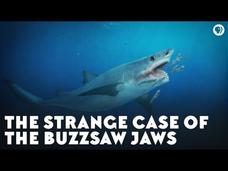Visual Learning Systems
The Law of Superposition and Index Fossils
In this video, the concept of the law of superposition is explained, which states that younger rock layers are found on top of older rock layers in sedimentary rocks. Additionally, the video introduces the concept of index fossils, which...
Institute for New Economic Thinking
What is Work? [Nancy Folbre]
What counts as work and what doesn't? Nancy Folbre shows how nearly half of all work done in this country is ignored by economists. She argues that we need to create better measures of non-market income, consumption and...
The March of Time
1940: PANAMA CANAL ZONE: US Destroyer (390) in tropical coastal water. US Battleship on water between cliffs (approach to Panama Canal). Bilingual sign: 'Prohibitied To Take Photographs On This Reservation' HA Distant WS US Battleship moving in lock.
MOT 1940: PANAMA CANAL ZONE: US Destroyer (390) in tropical coastal water. US Battleship on water between cliffs (approach to Panama Canal). Bilingual sign: 'Prohibitied To Take Photographs On This Reservation' HA Distant WS US...
Curated Video
Fossils: A Journey Through Earth's Past
Fossils are preserved specimens that provide us with information about plants and animals of the past. They contribute to our understanding of evolution and the history of life on Earth. Learn about different types of fossils and how...
PBS
A Brief History of Geologic Time
By looking at the layers beneath our feet, geologists have been able to identify and describe crucial episodes in life's history. These key events frame the chapters in the story of life on earth and the system we use to bind all these...
SciShow
Where Are All the Dinosaur Brains?
We've found plenty of dinosaur bones all around the world, but is it possible to find any fossilized soft tissues from ancient animals? Hosted by: Olivia Gordon ---------- Support SciShow by becoming a patron on Patreon:...
SciShow
Did Dinosaurs Really Have Feathers?
At least one entire class of dinosaurs seems to have had feathers—including velociraptors, and probably T. rex. Find out how we know, and how we even know what color some of them were! If you liked this video, check out more videos about...
MinuteEarth
America's Energy Future: MinuteEarth At The DemDebate
YouTube and NBC invited us to make a video for the final Democratic Candidate’s Debate before the US Presidential primaries. Here’s our video (about climate change & energy), Lester Holt’s question, & the candidates’ responses. Like our...
SciShow
Are Plastic Dinosaurs Made from Real Dinosaurs?!
You've probably heard this one before: Plastic is made from oil, and oil is made from dinosaurs, so a plastic dinosaur is made out of real dinosaur. It sounds pretty profound... but it's not that simple. If you liked this video, check...
SciShow
Luzia Among Specimens Likely Lost in Brazil Museum Fire | SciShow News
Right now, you can sign up for 2 months of free unlimited access to Skillshare: https://skl.sh/scishow15 Check out Matt Bellassai’s Skillshare class “Creating for the Viral Internet.”: https://skl.sh/2NoWDU6 Luzia, the oldest human...
Natural History Museum
Clean and Green: Is a Just Energy Revolution Around the Corner? | Our Broken Planet
How can we realise a world in which global communities have access to clean and sustainable energy for generations? Alternatives to fossil fuels are out there, and the clock is ticking to halt the most devastating impacts of climate...
Natural History Museum
Exploring an ancient ocean in 360° | Natural History Museum
Click and drag the 360° video to go on a fossil hunting adventure with Dr Susie Maidment and her team to an area of the prehistoric Sundance Sea in Wyoming, USA. Explore our interactive story about dinosaur hunting:...
Stated Clearly
What is the Evidence for Evolution?
Support Stated Clearly on Patreon: https://www.patreon.com/statedclearly Biologists teach that all living things on Earth are related. Is there any solid evidence to back this claim? Join us as we explore the facts! We start with a close...
Natural History Museum
Big teeth for a tiny dinosaur | Natural History Museum
A tiny dinosaur with big canine teeth showed for the first time how one of the earliest dinosaurs grew into an adult. Dinosaur expert, Dr Richard Butler, led a team of scientists from London, Cambridge and Chicago who used CT scans and...
Life Noggin
What If Whales Got Their Legs Back?
Whales!? With legs!? It was more common than you think! Watch more: “Could You Engineer Yourself To Live Underwater?” ►► https://www.youtube.com/watch?v=BYJ_Es9YMmY&t=24s Subscribe: https://bit.ly/SubLifeNoggin | Get your exclusive Life...
Name Explain
What Was The First Name In Recorded History?
HELP SUPPORT NAME EXPLAIN ON PATREON: https://www.patreon.com/nameexplain PRE-ORDER MY BOOK: http://bit.ly/originofnames TWITTER: https://twitter.com/NameExplainYT Thank you to all my Patrons for supporting the channel! SOURCES AND...
PBS
The Strange Case of the Buzzsaw Jaws
Shark teeth in Idaho, China, and Russia confused scientists for hundreds of years. A spiral of sharp teeth presented the first clue, but where would they even go on a shark? Learn more about the strange case in a video that is part of a...
PBS
The Whole Saga of the Supercontinents
See the world as it was—and also how it will be! A riveting video from a vast biology and earth science playlist takes viewers back in time to see how supercontinents formed, broke apart, and formed again. The resource includes a sneak...
Be Smart
Where Do Teeth Come From?
Surprisingly, dinosaur teeth and human teeth have a lot in common. Scholars discover how teeth form during embryonic development. They then compare fossil evidence of the similarities of teeth of ancient species.
The Atlantic Monthly Group
The Atlantic: What's in Crude Oil and How Do We Use It?
Understand the refining process that turns crude oil into gasoline, diesel fuel, aviation fuel, and other useful products with this video. [1:55]















